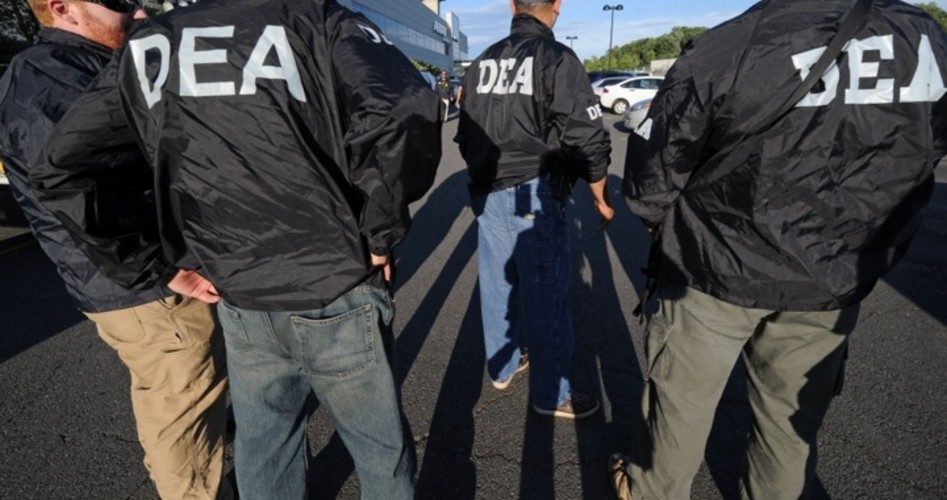
A report released on March 26 by the Justice Department’s inspector general reveals that agents with the Drug Enforcement Administration (DEA) are alleged to have had sexual encounters with prostitutes hired by drug cartels.
The report, entitled “The Handling of Sexual Harassment and Misconduct Allegations by the Department’s Law Enforcement Components,” examined “the nature, frequency, reporting, investigation, and adjudication of [allegations of sexual misconduct] in the Bureau of Alcohol, Tobacco, Firearms and Explosives (ATF); the Drug Enforcement Administration (DEA); the Federal Bureau of Investigation (FBI); and the United States Marshals Service (USMS).”
The report’s authors, working under the leadership of Michael Horowitz, the Justice Department’s inspector general, “determined that in 10 of the 113 allegations (9 percent), DEA supervisors failed to report allegations of sexual misconduct and sexual harassment through their chain of command or to the DEA’s Office of Professional Responsibility (OPR).”
The report provides specific details about the level of corruption that had permeated its operations in the “host country,” identified by other sources as Colombia:
During a series of interviews the DEA OPR conducted from 2009 through 2010, former host-country police officers alleged that several DEA agents, consisting of an Assistant Regional Director (ARD), an Assistant Special Agent in Charge (ASAC), six Supervisory Special Agents (SSA), and two line Special Agents formerly assigned to the an overseas office, solicited prostitutes and engaged in other serious misconduct while in the country.
The foreign officer allegedly arranged “sex parties” with prostitutes funded by the local drug cartels for these DEA agents at their government-leased quarters, over a period of several years. Although some of the DEA agents participating in these parties denied it, the information in the case file suggested they should have known the prostitutes in attendance were paid with cartel funds.
CNN reported that Horowitz criticized both the DEA and the FBI for being uncooperative with the investigation at first, with the DEA refusing to turn over documents they were required to under federal law.
CNN quoted Justice Department spokesman Patrick Rodenbush as saying that the department “takes the issues raised in the Inspector General report seriously and, as the appendix of the report makes clear, is taking steps to implement policies and procedures to help prevent them from happening in the future. The Department is already working with the law enforcement components to ensure a zero tolerance policy on sexual harassment and misconduct is enforced and that incidents are properly reported.”
The report itself spoke of this problem:
The OIG’s [Office of the Inspector General’s] ability to conduct this review was significantly impacted and delayed by the repeated difficulties we had in obtaining relevant information from both the FBI and DEA as we were initiating this review in mid-2013. Initially, the FBI and DEA refused to provide the OIG with unredacted information that was responsive to our requests, citing the Privacy Act of 1974 and concerns for victims and witnesses as the reasons for the extensive redactions, despite the fact that the OIG is authorized under the Inspector General Act to receive such information
Though after “months of protracted discussions” with management from both the DEA and FBI, noted the report, the agencies provided the requested information without extensive redactions. However, the OIG’s office found that the information was still incomplete and the OIG determined that information about a substantial number of allegations concerning both agencies was not included in the original responses to the OIG’s request.
The OIG’s concern was based on more than moral or ethical considerations, but also out of concern for our national security. It noted:
We were particularly troubled by multiple allegations involving several DEA special agents participating in “sex parties” with prostitutes while working in an overseas office. The misconduct occurred for several years while these special agents held Top Secret clearances. Many of these agents were alleged to have engaged in this high-risk sexual behavior while at their government-leased quarters, raising the possibility that DEA equipment and information also may have been compromised as a result of the agents’ conduct.
The DEA issued a response to the OIG report in a memorandum sent to Assistant Inspector General Nina Pelletier by the agency’s Acting Deputy Chief Inspector Michael Dixon. In his memorandum, Dixon cited the report’s findings that the DEA had properly investigated allegations of misconduct in 96 percent of the cases, but that “OIG focused the DEA portion of this report on the 3 percent of cases that, in their opinion, DEA could have investigated the allegations more thoroughly.”
Dixon noted that the OIG makes eight recommendations in the report, of which six recommendations are directed to the specific agencies, including the DEA. After listing the recommendations, Dixon noted DEA’s responses to them. Four of the recommendations were:
1. Agencies should “ensure that supervisors and managers report all allegations of sexual misconduct and sexual harassment to headquarters.”
2. Agencies should “ensure that all non-frivolous sexual harassment and sexual misconduct allegations are referred to their respective security personnel to determine if the misconduct raises concerns about the employee’s continued eligibility to hold a security clearance, and to determine whether the misconduct presents security risks.”
3. Agencies should “have and follow clear and consistent criteria for determining whether an allegation should be investigated at headquarters or should be referred back to the originating office to be handled as a management matter.”
4. Agencies “should use the offense categories specifically designed to address sexual misconduct and sexual harassment, and revise their tables if they are inadequate or otherwise deter the use of such categories.”
Dixon’s response to each of these was: “DEA concurs with the recommendation.”
The other two recommendations were largely technical in nature, and Dixon stated: “The DEA will defer to the Office of the Deputy Attorney General ‘s (ODAG) response to this recommendation.”
Going to the root of this potential scandal, it is worth considering that the Latin American drug cartels, including those in Colombia that paid for the prostitutes whose services were allegedly offered to DEA agents, have amassed an enormous amount of money, providing them with the resources to compromise the integrity of important law enforcement officials in their own countries.
When our nation sends its DEA agents into this corrupt environment south of the border, they are going into a situation where the drug lords often are more powerful that the legitimate government officials. Though we would hope that our federal agents are of impeccable moral character and immune from corruption — and a majority of them undoubtedly are — it is unreasonable to expect that 100 percent of them will remain so when immersed in such a corrupt environment.
As one example of how far this corruption can extend, Congress investigated a DEA program in 2011 that was laundering money for Mexican cartels. (Read “Congress Probes DEA Drug Money Laundering Scheme” for the complete story.)
The U.S. “War on Drugs” has been a failure in many ways, but its worst side effect goes far beyond its lack of success in stopping the drug flow. This war has led to the corruption of several federal agencies that have cooperated with the drug cartels, instead of stopping them. We recommend reading several of the articles related to this topic listed below, for full documentation and background information.
Former U.S. representative and presential candidate Ron Paul has often called the U.S. War on Drugs a failure. Its failures can be noted in more ways than one.
Photo of DEA agents in 2010: AP Images
Related articles:
U.S. Government and Top Mexican Drug Cartel Exposed as Partners
Congress Probes DEA Drug Money Laundering Scheme
CIA “Manages” Drug Trade, Mexican Official Says
Reports: CIA Working with Mexican Drug Cartels
Trafficker: U.S. Feds Aided Mexican Drug Cartel
Reports: CIA Working with Mexican Drug Cartels
Trafficker: U.S. Feds Aided Mexican Drug Cartel
Mexican Drug Trafficker Says He Worked With Feds
Stratfor Sources: U.S. Troops in Mexico as Feds Aid Cartels
Congress Probes DEA Drug Money Laundering Scheme
Feds Let Mexican Cartel Hit Men Kill in U.S., Senior Lawman Told Stratfor



